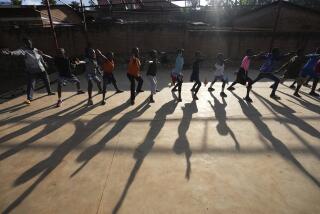Rwanda genocide leader sentenced to life in prison
- Share via
NAIROBI, KENYA — The ringleader of the 1994 Rwanda genocide was sentenced Thursday to life in prison for his role in the early days of an ethnic slaughter that eventually killed an estimated 800,000 people.
Theoneste Bagosora, 67, is the highest-ranking military officer convicted at the International Criminal Tribunal for Rwanda. The former colonel’s prosecution is viewed as a significant step in efforts to punish war crimes.
“This victory sends a message to people like the warlords in Darfur or those committing horrendous rapes and killings in Congo,” said Barbara Mulvaney, a Southern California lawyer who served as chief prosecutor. “Every time one of these guys goes down, the message is: Sooner or later you are going to be held accountable.”
Judges found Bagosora, as cabinet director of the Defense Ministry, culpable in the deaths of former Rwandan Prime Minister Agathe Uwilingiyimana, four opposition leaders and 10 Belgian peacekeepers, all killed in the early hours of the genocide. He was also convicted of overseeing four days of deadly rampages across the country.
But judges rejected allegations that Bagosora and others had plotted as early as 1990 to prepare for the genocide. Tribunal officials had charged Bagosora with “conspiracy to commit genocide,” hoping a conviction on the charge would refute those who still denied genocide had occurred and who claimed the violence was a spontaneous eruption of ethnic hostility.
The judges affirmed that genocide took place, but ruled that evidence was insufficient to prove Bagosora and others conspired in advance to commit the mass killings.
The 100-day massacre, which began in April 1994 and pitted Hutu extremists against Tutsi and Hutu moderates, was the most efficient and chillingly personal human slaughter in modern history.
Incited by hate messages on radio and armed by government officials, ordinary Rwandans -- including teachers, doctors and priests -- carried out much of the killing by hand with machetes. Neighbors turned against neighbors, spouses against spouses.
The verdict brought a much-needed victory to the United Nations-sponsored tribunal, which has been accused of spending too much time and money to prosecute crimes that occurred 14 years ago. By convicting the man many viewed as the mastermind of the genocide, the tribunal has accomplished one of its chief mandates, legal experts said.
“They’ve done a pretty decent job of bringing to justice the people behind the genocide,” said Sara Darehshori, a lawyer at Human Rights Watch who served as a tribunal prosecutor from 1995 to 1997.
The court also served as a model for the development of an international justice system, including the International Criminal Court.
“Just a few years ago these kinds of crimes were swept under the rug,” Darehshori said. “But in a short time that’s changed, and that is in large part due to this tribunal.”
She said the jury was still out on the tribunal’s final legacy, noting that its failure to prosecute cases against Tutsi rebels, who were also accused of war crimes, may tarnish the court’s reputation.
In Rwanda, where ethnic tension between Hutus and Tutsis is still raw, the verdict was received coolly. When the sentence was announced during a meeting in the capital, Kigali, lawmakers remained silent. At times, the government has clashed with the tribunal over who should try suspects.
But some genocide survivors expressed satisfaction.
“This justice is going to help the victims of the genocide recover their dignity,” said Didacienne Mukahabeshimana, a Rwandan human rights activist who is half Hutu and half Tutsi.
As the verdict was read in the tribunal’s courtroom in Arusha, Tanzania, live television showed Bagosora sitting quietly, separated from a public gallery by bulletproof glass and listening to a translation through earphones. He showed no emotion as the sentence was rendered, but afterward he smiled and posed for photos with his lawyers.
Under the rules of the tribunal, a death sentence was not an option.
Bagosora stepped up to run the country after the assassination of Rwandan President Juvenal Habyarimana, whose plane was shot down as it approached Kigali on April 6, 1994.
Shocked by the killing of the peacekeepers the next day, U.N. officials in New York quickly ordered a withdrawal, leaving hundreds of thousands of Tutsis and moderate Hutus at the mercy of Hutu extremists. The killing continued until Tutsi rebels, led by current Rwandan President Paul Kagame, seized control of the country three months later.
In court records, Bagosora was accused of arming militias and inflaming passions through public statements. “We must kill all Tutsi at all costs,” he was quoted as saying days before the genocide began, court records said.
Two other former military commanders, Lt. Col. Anatole Nsengiyumva and Maj. Aloys Ntabakuze, were also sentenced Thursday to life imprisonment. A fourth defendant, Gen. Gratien Kabiligi, former head of military operations, was acquitted and released.
Started in 1995, the tribunal is one of the biggest, most expensive war crimes courts ever convened, with several dozen cases, more than 1,000 employees from 80 nations and a budget of about $1.5 billion. To date it has announced 36 convictions and six acquittals.
Mulvaney, who resigned after the trial phase ended last year, said she had mixed feelings about the process, calling it a “hollow victory” for victims and suggesting that the money could have been better spent helping them rebuild their lives.
“A lot of Rwandans feel disenfranchised from the tribunal,” she said. “They think it’s a bunch of academics writing about genocide but never feeling the pain of the victims. People have to be smart about how things are done in the future to make it more relevant to real people.”
--
More to Read
Sign up for Essential California
The most important California stories and recommendations in your inbox every morning.
You may occasionally receive promotional content from the Los Angeles Times.










